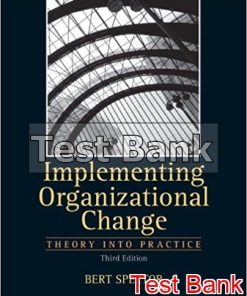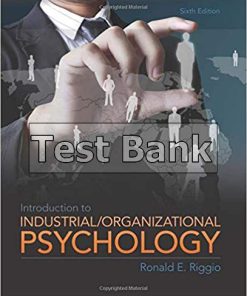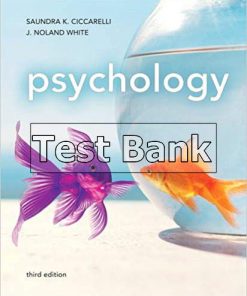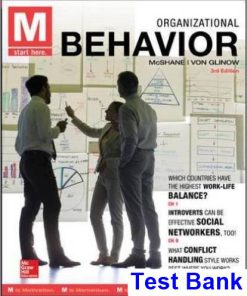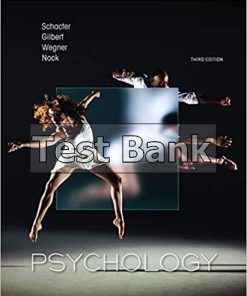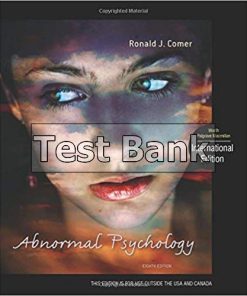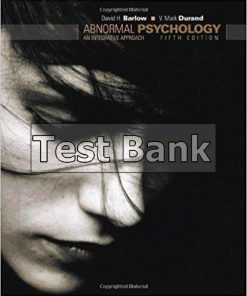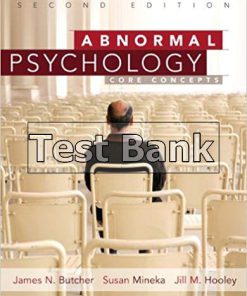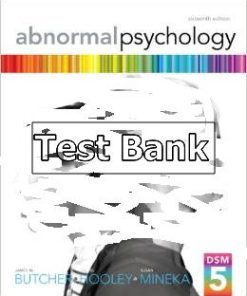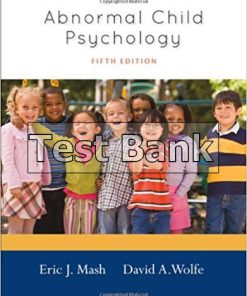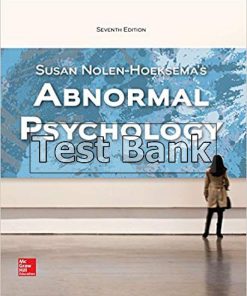Organizational Psychology 3rd Edition Jex Test Bank
You may also like
-
$26.50
$50.00 -
$26.50
$50.00
This is completed downloadable of Organizational Psychology 3rd Edition Jex Test Bank
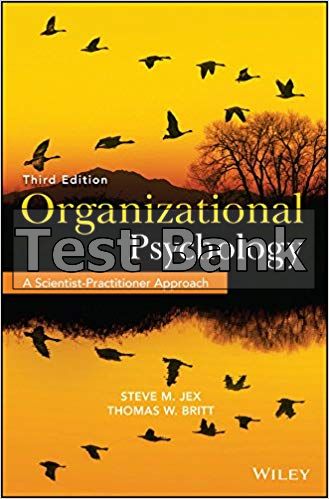
Product Details:
- ISBN-10 : 1118724070
- ISBN-13 : 978-1118724071
- Author:
Organizational Psychology: A Scientist-Practitioner Approach, Third Edition provides students with a thorough overview of both the science and practice of organizational psychology. Reflecting changes in the global workplace, the third edition expands coverage of the effects of technology on processes and personnel, the generalizability of theories across cultures, including organizational climate, and employee health and well-being. The new edition retains the hallmark features of the text and
- Expanded coverage of the pervasive effects of technology on the social environment of work, including virtual work and the impact of social media.
- More graphics, including tables and charts, to help students understand and remember various related concepts and theories.
- Includes a unique full chapter on research methods and the use of statistics in understanding organizations.
- New chapter on the work/non-work interface, including consideration of both employees’ life stages and changes over their careers.
- Provides Instructors with comprehensive presentation and testing materials.
- More on ethics, in light of relatively recent scandals in corporations and in politics.
- Expanded coverage throughout on cross-cultural issues and diversity in organizations.
- Additional readings facilitate in-depth learning.
Table of Content:
- Chapter 1 Introduction to Organizational Psychology
- What Is Organizational Psychology?
- Organizational Psychology in Context
- The Scientist-Practitioner Approach
- Historical Influences in Organizational Psychology
- Historical Beginnings
- The Field Takes Shape
- A Period of Growth
- Maturity and Expansion
- Recent Past and Beyond
- The Chapter Sequence
- Chapter Summary
- Suggested Additional Readings
- Chapter 2 Research Methods and Statistics
- Methods of Data Collection
- Observational Methods
- Archival Data
- Survey Research
- Experimentation
- Quasi-Experimentation
- Computer Simulations/Computational Modeling
- Choosing Among Data Collection Methods
- Special Issues in Data Collection
- Validity of Self-Reports
- Generalizing Laboratory Findings
- Gaining Access to Organizations
- Conducting Research in Different Cultures
- Ethics in Data Collection
- Statistical Methods in Organizational Psychology
- Descriptive Statistics
- Tests of Mean Differences
- Correlation and Regression Analysis
- Meta-Analysis
- Special Issues in Statistical Analysis
- Statistical Power in Organizational Research
- Detection of Moderator Variables
- Use of Causal Modeling
- Aggregation and Levels of Analysis
- Chapter Summary
- Suggested Additional Readings
- Chapter 3 Attraction and Socialization
- The Recruitment Process: An Organizational Perspective
- Recruitment Planning
- Recruiting Methods
- The Recruitment Process: The Applicant’s Perspective
- Organizational Socialization
- Defining Organizational Socialization
- The Socialization Process: An Organizational Perspective
- The Socialization Process: A Newcomer Perspective
- The Socialization Process: An Interactionist Perspective
- The Impact of Diversity on Organizational Socialization
- The Future of Organizational Socialization Research
- Chapter Summary
- Suggested Additional Readings
- Chapter 4 The Work-Nonwork Interface
- Some Basic Assumptions About the Work and NonWork Interface
- The Transition Into Work: Youth Employment
- Reasons for Youth Employment
- Nature of the Work
- Outcomes of Youth Employment
- General Conclusions About Youth Employment
- Transition to a Career
- Balancing Work and Nonwork Demands
- Antecedents of Work-Family Conflict
- Individual Factors
- Family Factors
- Consequences of Work-Family Conflict
- Reducing and Preventing Work-Family Conflict
- Organizational Support
- Supervisor Support
- Personal Coping
- The Positive Side of Work-Family Interface
- Work-Family Balance
- Transitioning Out of Work: Retirement
- Defining Retirement and Its Various Forms
- Factors Impacting the Initial Decision to Retire
- Adjustment to Retirement
- Chapter Summary
- Suggested Additional Readings
- Chapter 5 Productive Behavior in Organizations
- Defining Productive Behavior
- Job Performance
- Defining Job Performance
- Models of Job Performance
- Measurement of Job Performance
- Measures of Job Performance
- Typical Versus Maximum Job Performance
- Restriction in the Variability of Job Performance
- Instability in Job Performance Over Time
- Determinants of Job Performance
- Campbell’s Model of Job Performance
- General Mental Ability as a Predictor of Job Performance
- Job Experience as a Predictor of Job Performance
- Personality as a Predictor of Job Performance
- Organizational Citizenship Behavior
- Reasons for OCB
- Special Issues in OCB Research
- Innovation and Adaptability in Organizations
- A Description of Innovation as a Type of Job Performance
- Employee Attributes That Contribute to Creativity and Innovation
- Organizational Determinants of Creativity and Innovation
- Adaptive Performance
- Chapter Summary
- Suggested Additional Readings
- Chapter 6 Counterproductive Behavior in Organizations
- Defining Counterproductive Work Behavior
- The Structure of Counterproductive Work Behavior
- Bennett and Robinson’s Two-Factor Model
- Spector’s Five-Factor Model
- Gruys and Sackett’s 11 Factor Mode
- Causes of Counterproductive Work Behavior
- Person-Based Causes of CWB
- Situation-Based Causes of CWB
- Common Forms of Counterproductive Work Behavior
- Withdrawal in Organizations: Absenteeism
- Abuse of Others
- Low Base Rate Counterproductive Work Behavior
- Production Deviance/Sabotage
- Employee Theft
- Workplace Violence
- Drug and Alcohol Use
- Sexual Harassment
- Some Final Thoughts on Counterproductive Work Behavior
- Chapter Summary
- Suggested Additional Readings
- Chapter 7 Occupational Stress and Employee Health and Well-Being
- A Brief History
- Approaches and Terminology
- Occupational Stress Terminology
- Occupational Stress Models
- Institute for Social Research (ISR) Model
- Beehr and Newman’s Facet Model
- Demands-Control Model
- Job-Demands Resources Model
- Conservation of Resources (COR) Theory
- Person–Environment Fit Model
- Effort-Reward Imbalance
- Challenge-Hindrance Distinction
- The Possibility of Positive Responses to Stress
- Comparison of Occupational Stress Models
- Workplace Stressors
- Commonly Studied Stressors
- Contemporary Organizational Stressors
- Employee Safety
- Employee Health in Vulnerable Populations
- Reducing the Impact of Workplace Stressors
- Stress Management Training
- Reduction of Stressors
- Health and Fitness Programs
- Coping With Stress
- Recovery From Workplace Stressors
- Cross-Cultural Occupational Stress Research
- Generalizability
- Stressors Experienced
- Chapter Summary
- Suggested Additional Readings
- Chapter 8 Beliefs and Attitudes About Work and the Organization
- Job Satisfaction
- Defining Job Satisfaction
- Measurement of Job Satisfaction
- Predictors of Job Satisfaction
- Job Satisfaction: A Cross-Cultural Perspective
- Outcomes of Job Satisfaction
- Organizational Commitment
- Defining Organizational Commitment
- Measurement of Organizational Commitment
- Development and Predictors of Organizational Commitment
- Consequences of Organizational Commitment
- Combining Organizational Commitment and Job Satisfaction to Predict Performance
- Practical Applications of Commitment Research
- Additional Job Beliefs
- Perceived Organizational Support (POS)
- Organizational Identification
- Job Embeddedness
- Organizational Justice
- Effects of Multiple Work Beliefs on Employee Outcomes
- Chapter Summary
- Suggested Additional Readings
- Chapter 9 Theories of Motivation
- Defining Motivation, Basic Assumptions, and Theoretical Approaches
- Defining Motivation
- Basic Assumptions About Motivation
- Theoretical Approaches to Motivation
- Need-Based Theories of Motivation
- Maslow’s Need Hierarchy
- ERG Theory
- Need for Achievement Theory
- Cognitive Process Theories of Motivation
- Equity Theory
- Expectancy Theory
- Goal-Setting Theory
- Self-Regulation
- The Behavioral Approach to Motivation
- Self-Determination Theory
- Job-Based Theories of Motivation
- Motivation-Hygiene Theory
- Job Characteristics Theory
- Campion’s Multidisciplinary Approach
- Grant’s Relational Approach to Job Design
- Summary of Job-Based Theories
- The Practical Value of Motivation Theories
- Chapter Summary
- Suggested Additional Readings
- Chapter 10 Organizational Applications of Motivation Theory
- Some Basic Assumptions
- Behaviors Organizations Attempt to Influence
- Organizational Reward Systems
- Tangible Rewards
- Intangible Rewards
- Executive Compensation
- Motivation Through the Design of Work
- Job Design: A Brief History
- Humanistic Job Design
- The Job Characteristics Approach to Job Design
- The Interdisciplinary Approach to Job Redesign
- Integrating Approaches to Job Redesign
- Proactive Motivation and Job Crafting
- Proactive Motivation
- Job Crafting
- Organizational Disciplinary Procedures
- Progressive Discipline
- Chapter Summary
- Suggested Additional Readings
- Chapter 11 Leadership and Influence Processes
- Defining Leadership
- The Importance of Leadership
- General Approaches to Leadership
- The Trait Approach
- The Behavioral Approach
- The Contingency Approach
- Modern Theories of Leadership
- Fiedler’s Contingency Theory
- Path–Goal Theory
- Vroom–Yetton–Jago Model
- Leader–Member Exchange (LMX) Model
- Power and Influence in Organizations
- Defining Power
- Bases of Power
- Influence Tactics
- Politics in Organizations
- Chapter Summary
- Suggested Additional Readings
- Chapter 12 Team Dynamics and Processes Within Organizations
- Stages of Team Development
- Tuckman’s (1965) Stage Model
- Gersick’s Punctuated Equilibrium Model
- Defining Team Effectiveness
- Models of Team Effectiveness
- McGrath’s (1964) Model
- Gladstein’s (1984) Model
- Hackman’s (1987) Model
- Shea and Guzzo’s (1987) Model
- Campion’s Synthesis of Team-Effectiveness Models
- A Summary of the Team-Effectiveness Models
- Determinants of Team Effectiveness
- Team Composition
- Task Design
- Organizational Resources
- Rewards
- Team Goals
- Within-Team Processes
- Behavioral Processes
- Affective/Cognitive Processes
- Between-Team Processes
- Enhancing the Effectiveness of Teams
- Selection
- Organizational Reward Systems
- Team-Development Interventions
- The Future of Teams in Organizations
- Chapter Summary
- Suggested Additional Readings
- Chapter 13 Organizational Theory and Design
- What Is an “Organizational Theory”?
- Major Organizational Theories
- Classical Organizational Theories
- Humanistic Organizational Theories
- Contingency Organizational Theories
- Determinants of Organizational Design
- Strategy
- Level of Environmental Uncertainty
- Beliefs and Assumptions of Those in Power
- Organizational Size
- Major Technologies
- Recent Innovations in Organizational Design
- The Team-Based Organization
- The Matrix Organization
- The Virtual Organization
- The Network Organization
- Research on Organizational Design
- The Future of Organizational Design
- Chapter Summary
- Suggested Additional Readings
- Chapter 14 Organizational Culture and Climate
- Defining Organizational Culture
- Models of Organizational Culture
- The O’Reilly, Chatman, and Caldwell Model
- The Denison Model
- Human Synergistics Model
- Manifestations of Organizational Culture
- Symbols and Artifacts
- Rites and Rituals
- Stories, Legends, and Dramas
- Language and Communication
- The Development of Organizational Culture
- Measuring Organizational Culture
- Self-Report Assessments of Culture
- Ethnographic Methods of Culture Assessment
- Changing Organizational Culture
- Why Is Culture Change Difficult?
- The Nature of Organizational Culture Change
- The Impact of Organizational Culture
- Organizational Performance
- Recruitment and Retention
- Employee Satisfaction/Well-Being
- Organizational Culture and National Culture
- Organizational Climate: The Psychological Experience
- What Is Organizational Climate and How Does It Develop?
- Chapter Summary
- Suggested Additional Readings
- Chapter 15 Organizational Change and Development
- What Is Organizational Development and Why Is It Used?
- A Brief History of Organizational Development
- The Theory Base of Organizational Development
- General Theories of Change
- General Theories of Organizational Change
- Burke’s Theory of Organizational Change
- Organizational-Change Interventions
- Individual-Level Interventions
- Group-Level Interventions
- Comprehensive Organization-Wide Interventions
- Conditions Necessary for Successful Organizational Change
- Top Management Support
- The Consultant Guiding the Process
- General Resistance to Change
- Organizational Ownership of the Change and Development Process
- Evaluation of Organizational-Development Programs
- The Problem of Evaluative Criteria
- Evaluation Research Designs
- The Challenge of Measuring Change
- Evidence on the Effectiveness of Organizational Development
- Special Issues in Client-Consultant Relationships
- Balancing the Needs of Multiple Clients
- Maintaining Confidentiality
- Terminating a Consulting Relationship
- Chapter Summary
- Suggested Additional Readings
- References
- Author Index
- Subject Index
- EULA
People Also Search:
organizational psychology jex
organizational psychology 3rd edition jex
organizational psychology
organizational psychology 3rd edition download scribd
organizational psychology 3rd edition testbank download pdf
organizational psychology 3rd edition
organizational psychology jex and britt pdf

